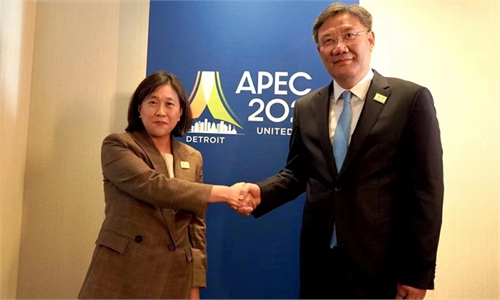
Illustration: Chen Xia/Global Times
Bilateral trade between China and the US has been on the decline this year, due in large part to the continuous US' "decoupling" push and antagonistic trade policy toward China.But at a time when the Biden administration needs to impress voters with economic progress - not regress - in the run-up to next year's election, such a China trade policy, which has hit the US economy like a boomerang, seems increasingly hard to sustain
China's trade with the US in yuan-denominated terms totaled 2.25 trillion yuan ($314 billion) in the first half of 2023, down 8.4 percent year-on-year and far underperforming China's overall foreign trade growth of 2.1 percent, data from China's General Administration of Customs showed on Thursday.
Specifically, exports to the US decreased 12 percent year-on-year, down 3.5 percentage points compared with the first five months of the year.
If anything, the figures suggest that the decline in China-US trade is continuing, probably as a result of the antagonistic US trade policy toward China and its push to force businesses to pivot away from China's supply chains.
US Census Bureau data showed that so far this year, Mexico has supplanted China as the top US trading partner, and in the four months to May, imports from China dropped 25 percent from a year earlier to $130 billion.
It remains hard to tell whether the continued weakening of bilateral trade is a short-term reflection of deteriorating political ties or a long-term structural trend, but one thing is certain - there are concerns shared by the US economic community that the slide in bilateral trade will have consequences for the US economy.
A Tuesday report from the Dallas Federal Reserve read that "to the extent that frictions with China account for Mexico's ascension in the trade rankings, the higher profile comes at a cost to US firms and consumers through higher input and purchase prices," according to Business Insider.
Envious of China's economic achievements and development over the past decades, some US politicians are becoming paranoid, perceiving that the US has been taken advantage of in trade with China, and bilateral trade policy needs to cover more factors, like national security and supply chain resilience, than economic rules.
But the essence of China-US economic and trade relations is mutual benefit. An antagonistic approach toward trade with China will only undermine the foundations of bilateral trade and give opportunities to others.
China's strengthened economic cooperation with ASEAN, which has risen to become the top trading partner of China, is a prime example.
The "decoupling" push by the US to suppress China's industrial chains has disrupted its own supply chains, resulting in increased costs, which then trickle down to US consumers.
As Chinese manufacturing has been deeply integrated into global industrial chains, the more the US imposes a geopolitical yoke on its economic and trade relations with China, the more unpredictable uncertainties it may face in its own supply chain. These consequences will ultimately be reflected in the US economy.
In this sense, some of the problems facing the US economy are actually related to Washington's economic suppression of Beijing, which has hit the US economy like a boomerang.
Now, deepening US economic problems, such as inflation and the federal debt burden, has made it increasingly hard for the US to continue its antagonistic China policy.
Without China's support and cooperation, these economic difficulties in the US will be further aggravated. This may explain why there have been positive signs of increased communication between senior economic officials from both countries.
The latest is news about a possible visit by US Commerce Secretary Gina Raimondo to China. Shu Jueting, spokesperson of China's Ministry of Commerce, said on Thursday that China is open to such a visit and is in communication with the US over the matter. China will remain committed to addressing economic and trade concerns through communication and dialogue, while promoting constructive and practical cooperation.
These signals are welcome developments, but what is needed most for the improvement of bilateral economic relations is more sincerity and action from the US, such as responding to China's concerns about tariffs imposed on Chinese goods since 2018 and its sanctions against Chinese companies.
Elimination of such policies that have made businesses and consumers in both countries suffer will be conducive to both sides in better dealing with their economic challenges.



